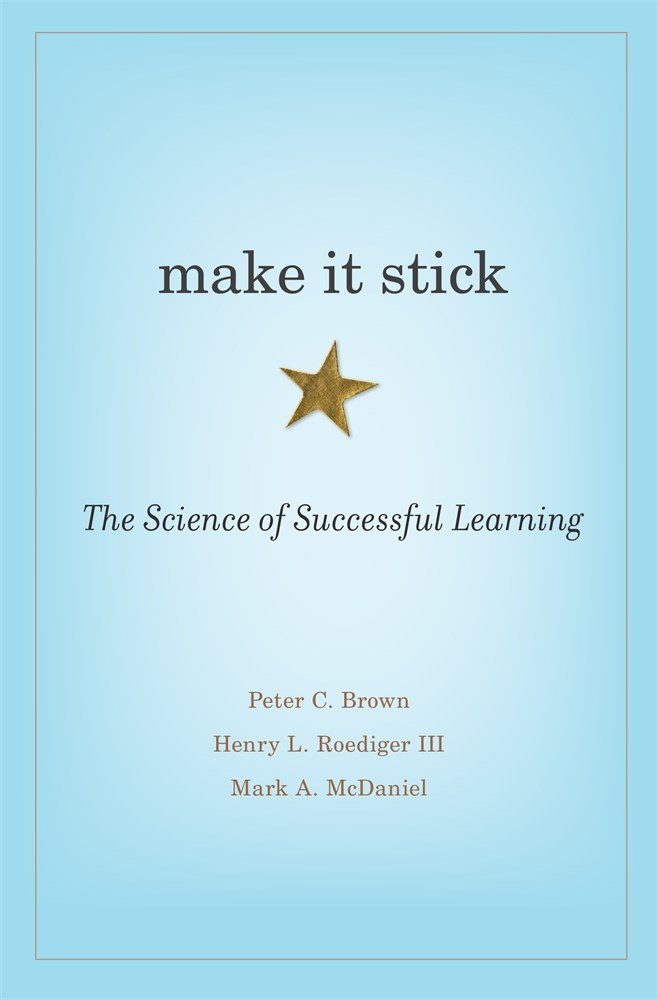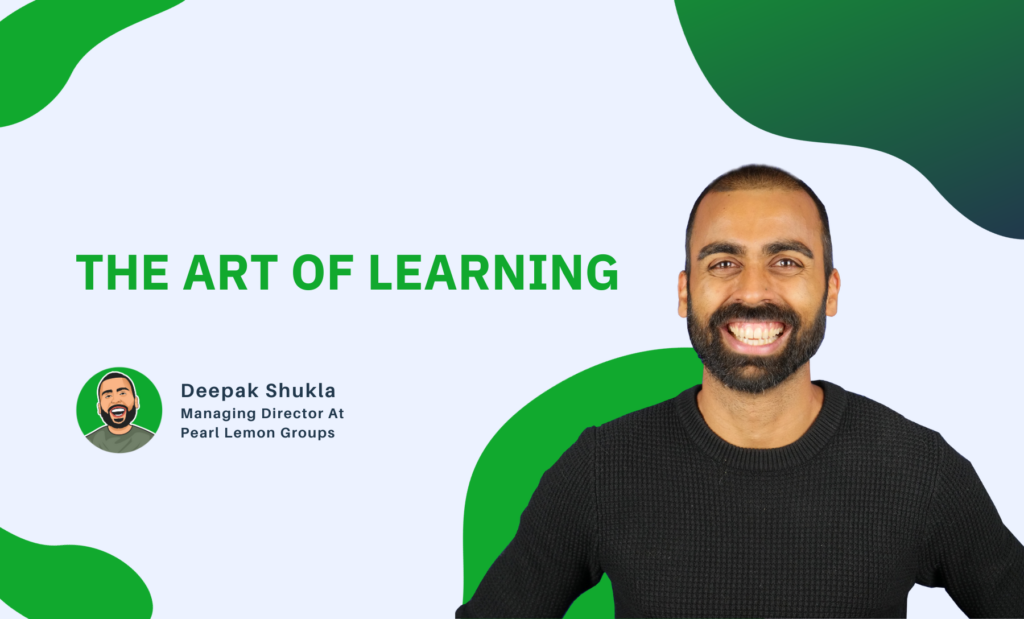The Art of Learning: My Thoughts on ‘Make It Stick: The Science of Successful Learning Book by Henry L. Roediger III, Mark A. McDaniel, and Peter C. Brown
Introduction
Hey there, folks! 😊
I’m Deepak Shukla, the ever-curious entrepreneur constantly searching for ways to elevate my skills and knowledge.
Today, I’m thrilled to share captivating insights from the tome currently holding my attention: “Make It Stick: The Science of Successful Learning” by Henry L. Roediger III, Mark A. McDaniel, and Peter C. Brown.
Too often in our learning journeys, we become ensnared in the deceptive trap of mindlessly repeating information.
The common misconception is that sheer, brute repetition magically etch the material deep into our brains.
However, as this enlightening book proposes, mastering a more effective learning technique and making the knowledge ‘stick’ is within our grasp.
Allow me to guide you through the pivotal takeaways from “Make It Stick” and illustrate how these pearls of wisdom seamlessly align with my philosophy towards continuous learning and relentless personal growth.
The Power Of Interleaving: Breaking The Repetition Cycle 📚
Interleaving is one of the groundbreaking concepts in the book that riveted my attention.
This idea robustly challenges and overturns the conventional wisdom surrounding repetitive learning.
It audaciously advocates for a paradigm shift towards a more dynamic approach, suggesting that integrating variety is the golden key.
“Instead of obsessively focusing on a singular concept or task, with the goal of embedding it into your memory, consider intermittently shifting your focus. Engage with a topic just enough to grasp its essence, then deliberately pivot your attention to another.”
Interleaving is not about achieving instant gratification or short-term wins.
Instead, it’s a strategic play for the long game, yielding sustained, long-term learning and retention dividends.
When you diversify the scenarios or topics you engage with, you’re compelling your brain to adapt continuously, promoting a robust foundation and structure in your learning process.

The Art Of Recall And Retrieval: Flexing Your Mental Muscles 💪
Another dazzling gem embedded in the pages of “Make It Stick” is the indispensable technique of recall and retrieval.
Recall is the proactive practice of testing yourself, making deliberate efforts to summon information from the recesses of your memory without prompts or cues.
“Recall isn’t about rote memorisation; it’s about reviving and revitalising the dormant knowledge within, making it accessible and usable.”
Coupled with interleaving, these techniques form a potent duo that amplifies your learning efficacy, fostering a deep, intrinsic connection with the material and facilitating its effortless retrieval when needed.
Putting It Into Practice: My Approach 🚀
How do these insights and strategies delineated in “Make It Stick” resonate with and reflect on my entrepreneurial odyssey?
Let’s dissect and delve deeper into my personalised approach to learning.
“Knowledge acquisition is a symphony, not a solo. It demands the harmonious integration of diverse learning sources, techniques, and perspectives.”

Diverse Learning Sources
Immersing in various educational materials simultaneously offers a unique perspective on learning.
Engaging with multiple books concurrently illuminates different aspects of knowledge and wisdom, each volume providing its distinctive take on the subject matter at hand.
This eclectic approach not only broadens my intellectual horizon but also keeps my cognitive faculties agile and responsive.
By navigating through diverse topics and themes, I expose myself to a rich tapestry of insights and viewpoints.
This diversity is crucial for fostering a holistic understanding and appreciation of the vast landscape of knowledge.
Furthermore, it cultivates a dynamic and flexible mindset, essential for adapting to the ever-changing and complex environment of today’s world.
Engaging with different sources concurrently serves as a continuous source of intellectual stimulation and excitement, making the learning journey not just a routine but an adventure of discovery and enlightenment.
Reinforcement Through Voice Notes
Voice notes serve as a valuable tool for reinforcing learning.
When articulating thoughts audibly, it necessitates processing and organising the information coherently and succinctly.
This practice demands a clear understanding and grasp of the material, akin to the process of teaching.
When you explain complex concepts, either to yourself or others, it invariably strengthens your understanding and retention of the information.
Speaking your thoughts and insights out loud consolidates the learning process by engaging different cognitive and sensory faculties.
It facilitates a deeper connection with the material, promoting not just memorization but genuine understanding and appreciation of the subject matter.
Moreover, voice notes provide an opportunity for review and reflection, serving as aural markers of your intellectual journey and progress.

Daily Journaling And Newsletters
Journaling is more than just recording information; it’s an intentional practice that promotes deep engagement with the learning material.
By taking time daily to write, reflect, and analyse, I create a space where knowledge is processed and internalised.
This methodical approach supports not only the retention of information but also its integration into my cognitive framework.
Writing necessitates a form of active recall, bringing the learned material to the forefront of my consciousness, thus facilitating its consolidation in my memory.
Furthermore, sharing these insights through newsletters allows for the externalisation of knowledge, fostering a sense of community and shared understanding among like-minded individuals.
It provides an opportunity for feedback and dialogue, further enriching the learning experience.
Active Recall And Retrieval
Active recall and retrieval are integral components of an effective learning strategy.
This proactive approach involves consciously pulling information from memory, engaging with the material on a deeper level.
Not only does this enhance retention, but it also fosters a more robust understanding of the subject matter.
The practice of recall is not passive; it’s an engaging process that requires effort and concentration, akin to exercising your mental muscles.
This engagement strengthens the neural pathways associated with the learned material, making it more accessible and easier to retrieve in the future.
Similarly, active recall encourages the forming of connections between different pieces of information, weaving them into a comprehensive tapestry of knowledge and understanding, facilitating not just learning but also the application of this knowledge in various contexts and situations.
Final Thoughts 🌟
Adopting and implementing effective learning strategies is imperative in the contemporary landscape, where we’re inundated with a relentless torrent of information.
“Make It Stick” offers a fresh, innovative perspective on mastering the art of learning.
Embrace the transformative power of interleaving, recall, and retrieval to enhance your learning experience and make the knowledge indelibly ‘stick’.
Whether you’re an entrepreneur, a student, or a lifelong learner, this book is a treasure trove of insights that can illuminate your path to success through continuous learning and personal growth.
“Remember, the journey to success is intricately linked with your commitment to continuous learning and growth. Challenge conventional learning paradigms and make the knowledge resonate and stick with you, leaving an indelible mark on your mind and soul!” 😇
Key Takeaways From ‘Make It Stick: The Science of Successful Learning Book by Henry L. Roediger III, Mark A. McDaniel, and Peter C. Brown
Effective Learning Strategies
- Avoid mindless repetition; it doesn’t necessarily lead to effective learning.
- Embrace diverse, dynamic techniques to make knowledge ‘stick’.
Power Of Interleaving
- Interleaving challenges traditional repetitive learning.
- Mixing up learning topics enhances long-term retention.
- It helps the brain adapt and strengthens foundational learning.
Recall And Retrieval
- Practicing recall helps in actively engaging with the learning material.
- Recall is about bringing dormant knowledge to the surface.
- The combination of interleaving with recall and retrieval techniques amplifies learning efficacy.
Personal Learning Approach
- Engage with multiple learning sources simultaneously for a diverse perspective.
- Voice notes can help reinforce and consolidate learning.
- Daily journaling aids in processing and remembering information.
- Actively practice recall and retrieval to solidify learning and enhance the ability to connect information.

Book Summary
Explore ‘Make It Stick: The Science of Successful Learning’ by Henry L. Roediger III, Mark A. McDaniel, and Peter C. Brown, a transformative guide revealing powerful techniques for effective learning and memory. Debunking common studying myths, the authors advocate scientifically-proven strategies. They introduce ‘interleaving,’ advocating diverse practice for stronger concept differentiation and memory recall. ‘Retrieval practice’ emphasises self-testing, fortifying neural connections. Spaced repetition, a key strategy, enhances long-term retention. With engaging anecdotes and accessible cognitive psychology insights, this book empowers learners to adopt active, varied approaches, emphasizing the importance of making knowledge truly stick



